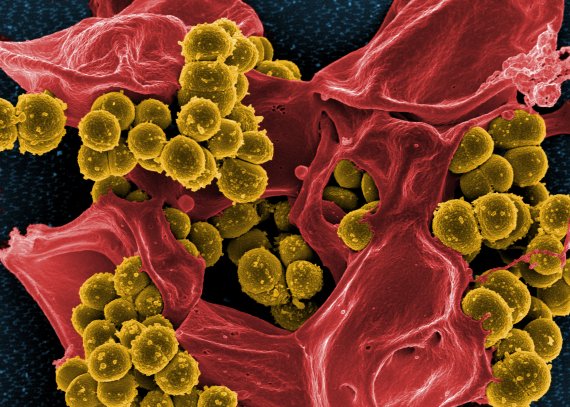<photo: artist’s impression of MRSA in tissue>
The measures taken in livestock farming to fight the antibiotic resistant bacteria are primarily aimed at ESBL-producing bacteria, says Mevius, because those pose the biggest risk to public health. When bacteria produce the Extended-spectrum beta-lactamase enzyme, then these strains can break specific antibiotics that are important to humans and livestock and render the medicine ineffective. To impede the spread of ESBL-producing bacteria, livestock farmers are now only allowed to use these antibiotics when there is no other option. This policy has led to a reduced use of antibiotics and reduced amounts of ESBL-producing bacteria in livestock farming, states Mevius.
‘The problem is certainly not solved yet’, says Mevius. ‘Achieving that requires more time, and possibly structural changes that would restrain a quick spread of such resistance. That is not an easy thing to do.’
MRSA
The MRSA from livestock does not pose a risk to public health. Although it does indeed occur a lot in livestock farming, this agricultural MRSA is a strain of bacteria adapted to animals, which easily colonises, survives and spreads among animals, but which barely – if at all – occurs in hospitals. It is a problem for animals and livestock farmers who are in direct contact with this bacterium. MRSA can cause infections of the skin and wounds that cannot be treated properly using common antibiotics such as penicillin and tetracycline. Because these tetracyclines and penicillins are still used in livestock farming, the livestock-related MRSA strains are still found.
The danger of MRSA is hidden in the mutations of the livestock-related strains that copy genetic material from the human MRSA strains, says Mevius. Contrary to the livestock variant, the human MRSA is a problem for public health. But Mevius has no indications of such mutations as of yet.
Achievement
Mevius’ message is twofold. On the one hand, the Dutch livestock industry has achieved a fantastic feat by halving its use of antibiotics in a short time. ‘We are now an exemplary country. We receive invitations from around the world to explain how to strongly diminish the use of antibiotics in a country with many animals and people.’ On the other hand, the consequences of antibiotics use are sometimes irreversible. ‘The ESBL-producing bacteria have gotten out of hand, and we won’t be able to get rid of them. By now, they are everywhere in the environment. The only thing you can do is control, try to restrain the spread. This is why research into the spreading of ESBL-producing bacteria in food chains is so important.’
Additional reading (partly in Dutch):
ESBL verspreidt zich snel door een koppel vleeskuikens
Still plenty of MRSA to be found in pork production chain

